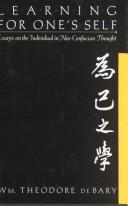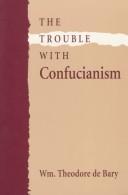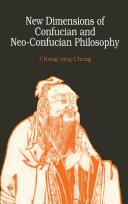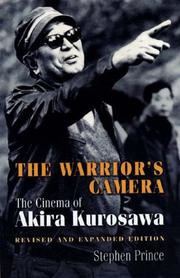| Listing 1 - 7 of 7 |
Sort by
|
Book
ISBN: 8842038342 Year: 1991 Publisher: Bari Laterza e Figli
Abstract | Keywords | Export | Availability | Bookmark
 Loading...
Loading...Choose an application
- Reference Manager
- EndNote
- RefWorks (Direct export to RefWorks)
Guilt --- Neo-Confucianism --- Shame --- Sin
Book
ISBN: 0674030311 9780674030312 Year: 1991 Publisher: Cambridge, Mass. : Harvard University Press,
Abstract | Keywords | Export | Availability | Bookmark
 Loading...
Loading...Choose an application
- Reference Manager
- EndNote
- RefWorks (Direct export to RefWorks)
In Singapore, Korea, Taiwan, Japan, and other parts of East and Southeast Asia, as well as China, people are asking, "What does Confucianism have to offer today?" For some, Confucius is still the symbol of a reactionary and repressive past; for others, he is the humanist admired by generations of scholars and thinkers, East and West, for his ethical system and discipline. In the face of such complications, only a scholar of Theodore de Bary's stature could venture broad answers to the question of the significance of Confucianism in today's world.
Confucianism. --- Neo-Confucianism. --- Confucianism --- Philosophy, Chinese --- Religions --- Philosophy.

ISBN: 0231074263 9780231074261 Year: 1991 Publisher: New York Columbia University Press
Abstract | Keywords | Export | Availability | Bookmark
 Loading...
Loading...Choose an application
- Reference Manager
- EndNote
- RefWorks (Direct export to RefWorks)

ISBN: 067491015X 0674910168 9780674910164 9780674910157 Year: 1991 Publisher: Cambridge (Mass.): Harvard university press
Abstract | Keywords | Export | Availability | Bookmark
 Loading...
Loading...Choose an application
- Reference Manager
- EndNote
- RefWorks (Direct export to RefWorks)
S12/0400 --- S12/0430 --- Confucianism --- Neo-Confucianism --- Philosophy, Chinese --- Religions --- China: Philosophy and Classics--Kongzi 孔子 Confucius and Confucianism --- China: Philosophy and Classics--Neo-Confucianists: general and Song (including lixue 理學) --- Neo-Confucianism. --- Confucianism.

ISBN: 0585091730 9780585091730 0791402835 0791402843 9780791402832 9780791402849 0791498891 Year: 1991 Publisher: Albany, N.Y. : State University of New York Press,
Abstract | Keywords | Export | Availability | Bookmark
 Loading...
Loading...Choose an application
- Reference Manager
- EndNote
- RefWorks (Direct export to RefWorks)
Philosophy, Confucian. --- Neo-Confucianism. --- Philosophy, Confucian --- Neo-Confucianism --- Philosophy --- Philosophy & Religion --- Confucianism --- Philosophy, Chinese --- Confucian philosophy --- S12/0215 --- S12/0242 --- S12/0400 --- S12/0430 --- S12/0805 --- China: Philosophy and Classics--Philosophy of language --- China: Philosophy and Classics--Contemporary Chinese philosophy --- China: Philosophy and Classics--Kongzi 孔子 Confucius and Confucianism --- China: Philosophy and Classics--Neo-Confucianists: general and Song (including lixue 理學) --- China: Philosophy and Classics--Influence of Foreign philosophy on Chinese philosophy
Book
ISBN: 7301000448 9787301000441 Year: 1991 Publisher: 北京 北京大学出版社
Abstract | Keywords | Export | Availability | Bookmark
 Loading...
Loading...Choose an application
- Reference Manager
- EndNote
- RefWorks (Direct export to RefWorks)
Neo-Confucianism --- Buddhism --- Metaphysics --- S12/0211 --- S12/0430 --- S13A/0340 --- Confucianism --- Philosophy, Chinese --- God --- Ontology --- Philosophy --- Philosophy of mind --- Buddha and Buddhism --- Lamaism --- Ris-med (Lamaism) --- Religions --- China: Philosophy and Classics--Metaphysics --- China: Philosophy and Classics--Neo-Confucianists: general and Song (including lixue 理學) --- China: Religion--Chinese Buddhism: history

ISBN: 0691031606 0691008590 0691214182 Year: 1991 Publisher: Princeton : Princeton University Press,
Abstract | Keywords | Export | Availability | Bookmark
 Loading...
Loading...Choose an application
- Reference Manager
- EndNote
- RefWorks (Direct export to RefWorks)
The Japanese film director Akira Kurosawa, who died at the age of 88, has been internationally acclaimed as a giant of world cinema. Rashomon, which won both the Venice Film Festival's grand prize and an Academy Award for best foreign-language film, helped ignite Western interest in the Japanese cinema. Seven Samurai and Yojimbo remain enormously popular both in Japan and abroad. In this newly revised and expanded edition of his study of Kurosawa's films, Stephen Prince provides two new chapters that examine Kurosawa's remaining films, placing him in the context of cinema history. Prince also discusses how Kurosawa furnished a template for some well-known Hollywood directors, including Martin Scorsese, Steven Spielberg, and George Lucas. Providing a new and comprehensive look at this master filmmaker, The Warrior's Camera probes the complex visual structure of Kurosawa's work. The book shows how Kurosawa attempted to symbolize on film a course of national development for post-war Japan, and it traces the ways that he tied his social visions to a dynamic system of visual and narrative forms. The author analyzes Kurosawa's entire career and places the films in context by drawing on the director's autobiography--a fascinating work that presents Kurosawa as a Kurosawa character and the story of his life as the kind of spiritual odyssey witnessed so often in his films. After examining the development of Kurosawa's visual style in his early work, The Warrior's Camera explains how he used this style in subsequent films to forge a politically committed model of filmmaking. It then demonstrates how the collapse of Kurosawa's efforts to participate as a filmmaker in the tasks of social reconstruction led to the very different cinematic style evident in his most recent films, works of pessimism that view the world as resistant to change.
791.44
---
J6839
---
J6800.80
---
Filmproductie. Filmindustrie
---
Japan: Media arts and entertainment -- cinema
---
Japan: Performing and media arts -- history -- Gendai (1926- ), Shōwa period, 20th century
---
Kurosawa, Akira
---
-Criticism and interpretation
---
791.44 Filmproductie. Filmindustrie
---
Kurosawa, Akira,
---
Heize, Ming,
---
Kurosava, Akira,
---
Kurōcāvā, Akirā,
---
黑沢明,
---
黑澤明,
---
黒沢明,
---
黒澤明,
---
Kūrūsāvā, Ākīrā,
---
کوروساوا، آکيرا,
---
Criticism and interpretation.
---
黑沢明
---
Film.
---
Cine
---
Producción y dirección
---
Kurosawa, Akira.
---
Crítica e interpretación.
---
Bibel
---
Japan.
---
American Western.
---
Ashikaga era.
---
Bakhtin, Mikhail.
---
Buddhism.
---
Chaplin, Charles.
---
Dersu Uzala.
---
Dodeskaden.
---
Drunken Angel.
---
Eisenstein, Sergei.
---
Godard, Jean-Luc.
---
Gorky, Maxim.
---
Hayasaka Fumio.
---
Hojoki.
---
Ikiru.
---
Kagemusha.
---
Leone, Sergio.
---
Madadayo.
---
Marxism.
---
Nakadai Tatsuya.
---
Neo-Confucianism.
---
Noh theater.
---
Oda Nobunaga.
---
Oguni Hideo.
---
Peckinpah, Sam.
---
Ran.
---
Red Beard.
---
Sengoku period.
---
Shimura Takashi.
---
Takeda Shingen.
---
Tokugawa period.
---
haiku.
---
individualism.
---
karma.
---
satori.
---
Philemonbrief
---
<
| Listing 1 - 7 of 7 |
Sort by
|

 Search
Search Feedback
Feedback About
About Help
Help News
News